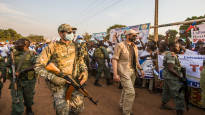Russia has increased its influence in Africa in recent years. Its workhorse has been the Russian mercenary army Wagner, whose mercenaries have been seen in several countries, often called by autocratic leaders.
Now the situation is complicated. Wagner’s director Yevgeny Prigozhin revolted against the Russian military leadership in June. In August, he reportedly died in a plane crash, possibly the president Vladimir Putin at the behest of.
The future of the mercenary army in Africa is now shrouded in darkness. This is the assessment of those who have studied the continent Nic Cheesemanwho is Professor of Democracy and International Development at the University of Birmingham.
– The question arises as to who will lead Wagner. What are its own interests in Africa? Cheeseman, who visited Demo Finland’s democracy days in Finland, says in an interview with .
Wagner’s success has been exaggerated
It has been speculated that the Russian administration is trying to take over Prigozhin’s activities in Africa in one way or another directly. It’s not quite easy.
Prigozhin’s complex cluster of companies has provided African autocrats not only with mercenaries but also with help in falsifying elections, spreading fake news and lobbying. In return, it has received rights to natural resources.
– Wagner is an abuser who seeks profits, says Cheeseman.
At the same time, according to Cheeseman, an exaggerated image of Wagner’s influence and success has been created in the media. This has also been fueled by the mercenary army itself, because it has thus been able to market its services.
– It operates militarily in about four countries, and its presence in these four countries is quite small, says Cheeseman.
These countries are Sudan, Libya, Mali and the Central African Republic. Wagner has also failed in several of his operations.
– In Mozambique, Wagner suffered heavy losses and withdrew. In Madagascar, it tried to manipulate elections, but the effect was small, says Cheeseman.
Russia’s reputation may weaken in Africa
Until now, the reputation of Russia and even Wagner has been good in many African countries. In their propaganda, they have skillfully used the bitterness left behind by the European colonial power.
Russia can also claim that its predecessor, the Soviet Union, supported the fall of colonial power in Africa.
Many in Africa do not think that Russia’s war of aggression against Ukraine is about building a new empire.
For example, in ‘s story last fall, the South African interviewees blamed NATO for the war and thought that Russia was on the side of the oppressed.
Cheeseman still thinks that before long Africans will be disappointed with both Wagner and Russia.
Wagner’s handprint in Africa is dark. For example, the UN believes it is believed to have been responsible for the massacre of more than 500 civilians in Mali last year.
Russia, on the other hand, hardly has the resources to support the development and security of African countries in the long term. Its economic contribution to Africa is very small, only one percent of all foreign investments.
According to Cheeseman, the reputation also begins to crumble when information about the crimes committed by Wagner and Russia spreads.
– The problem with Wagner and Russia is that the longer they are visible in Africa, the more their activities are scrutinized and the more they start to be opposed.
More attention to supporting democracy
According to Cheeseman, Western countries have focused too much on security, especially in West Africa.
In the French-led operations in Mali and Chad, Islamist rebels have been repelled. There has been less support for governance and democracy.
This has left room for players like Wagner and Russia.
According to Cheeseman, in order to support democracy successfully, it would require humility from Western countries. A lecturing attitude does not work because it raises backlash.
– We should not think that we can bring democracy from outside. We should show that democracy has benefits and then support countries that are moving in that direction, says Cheeseman.
